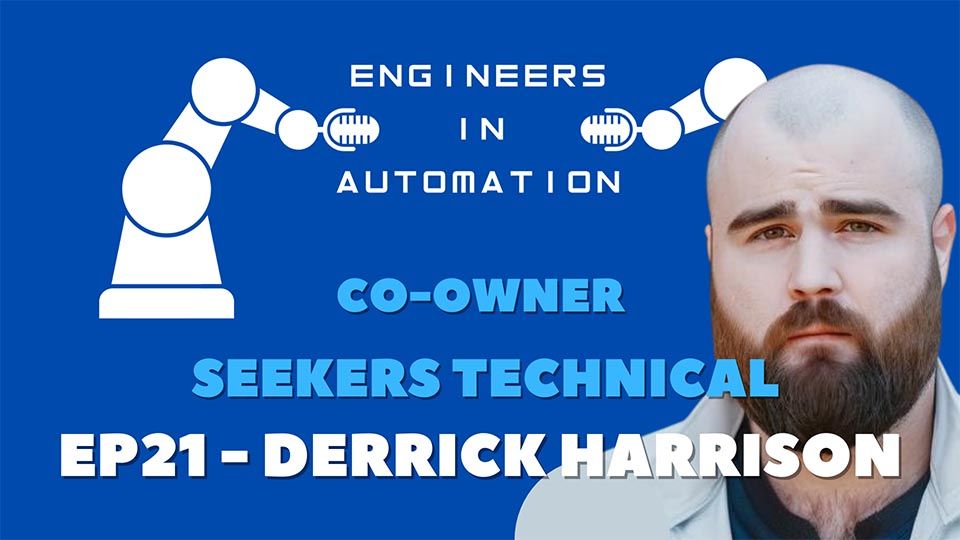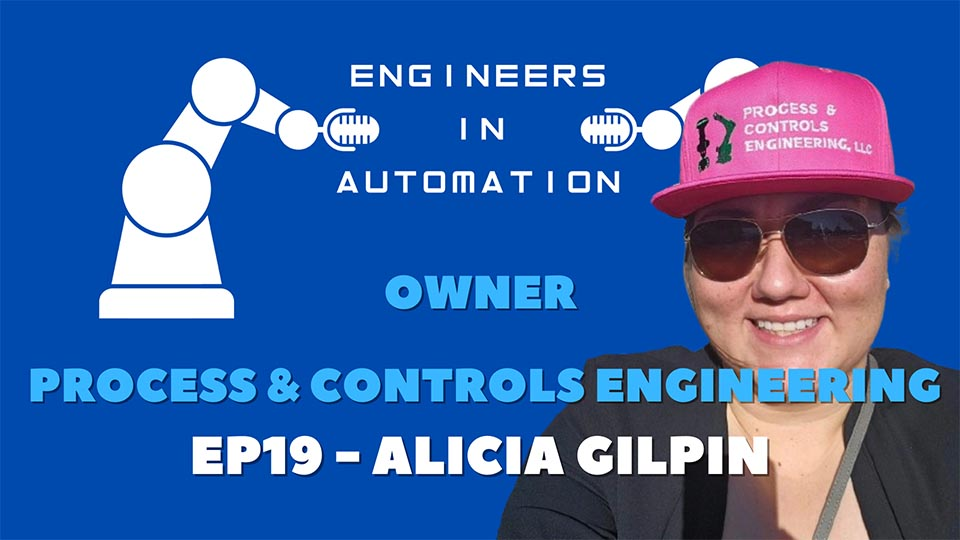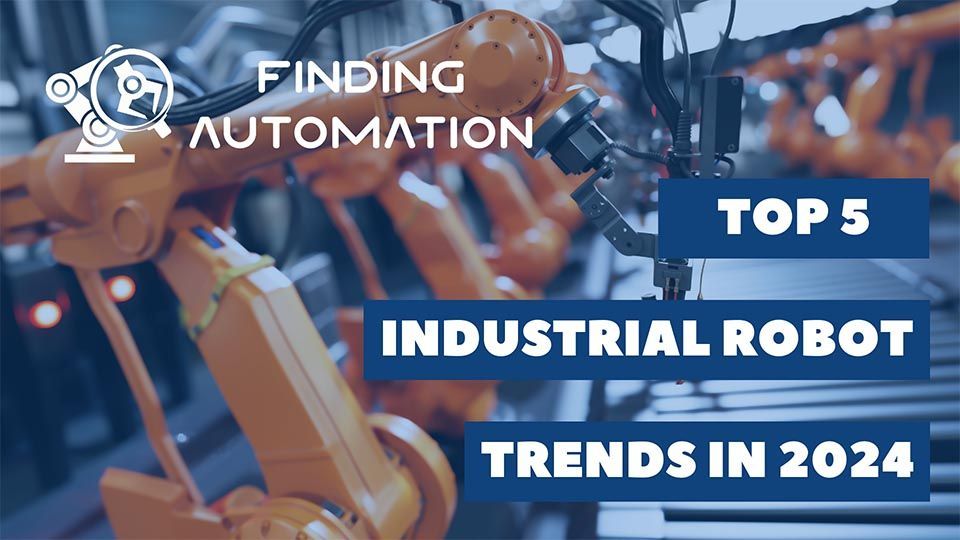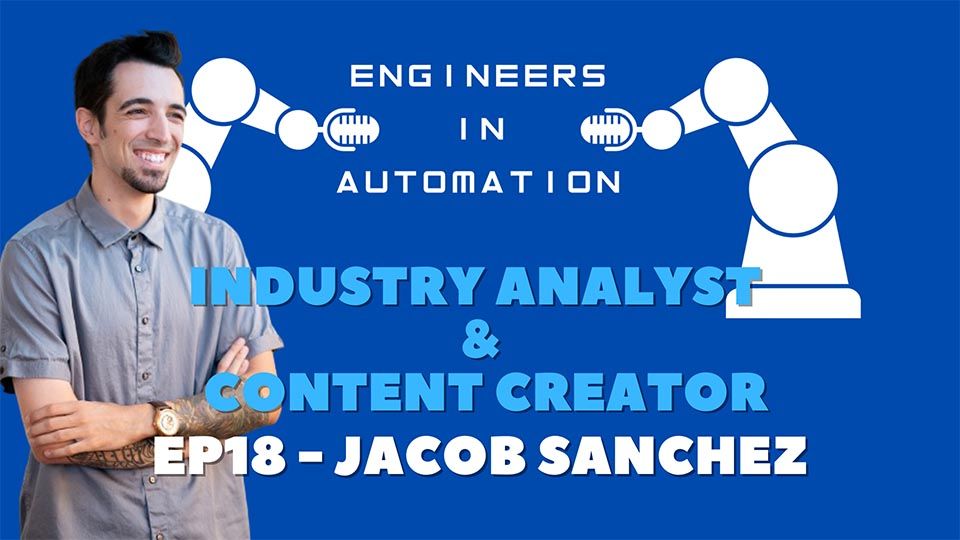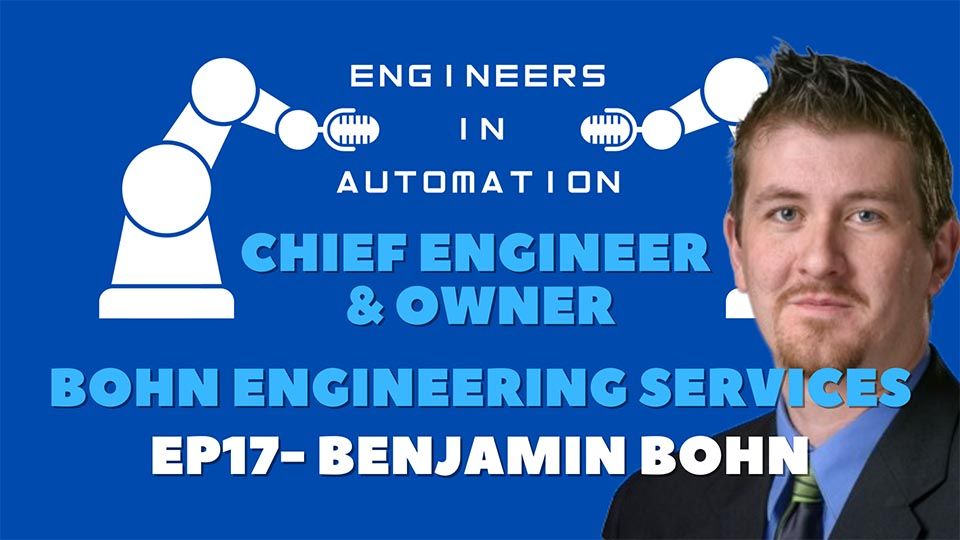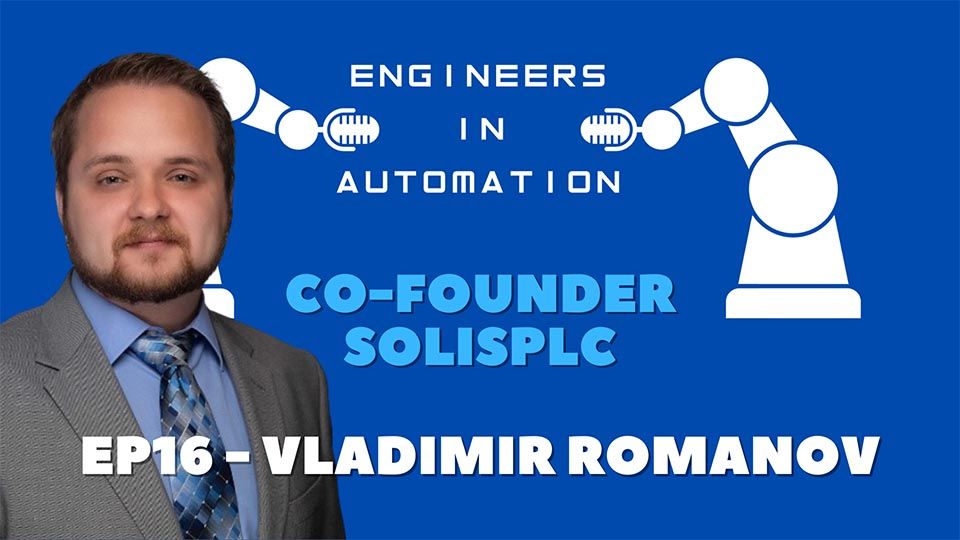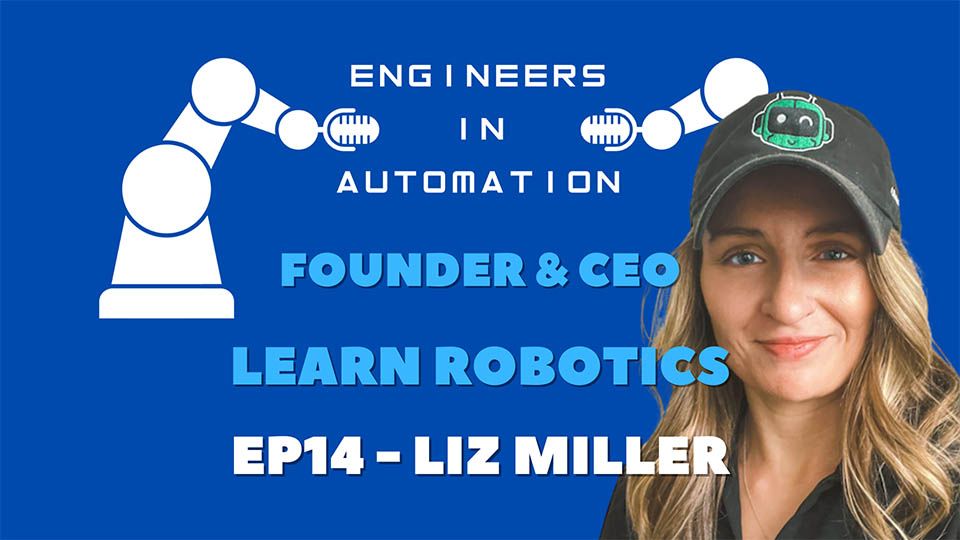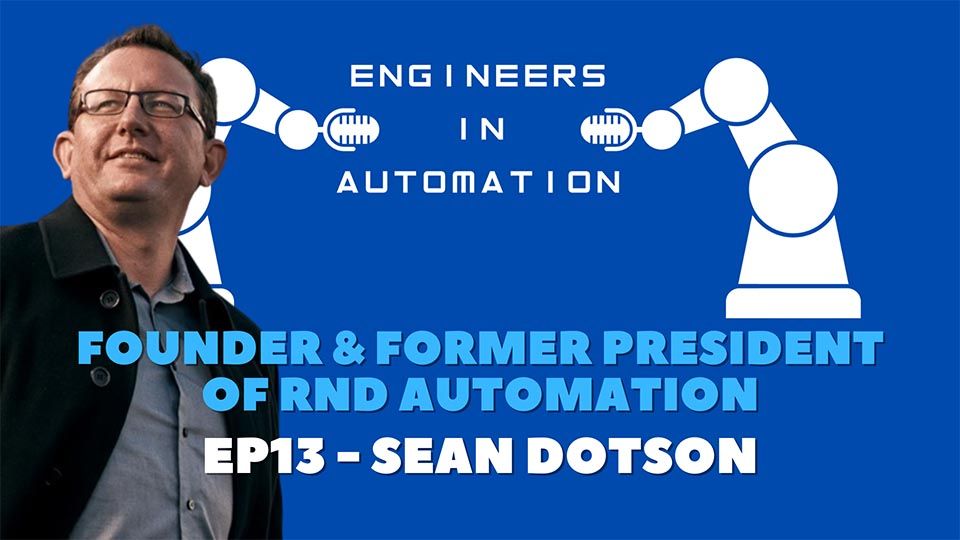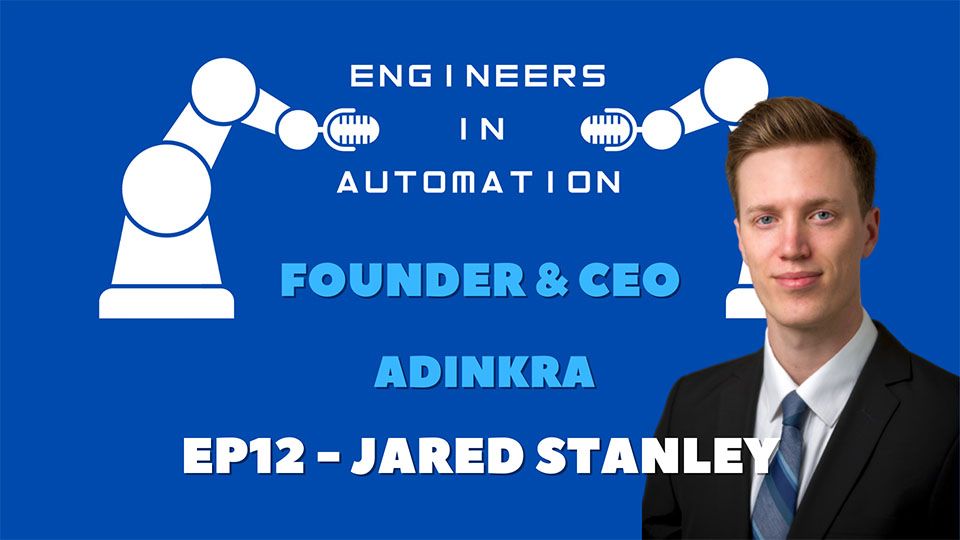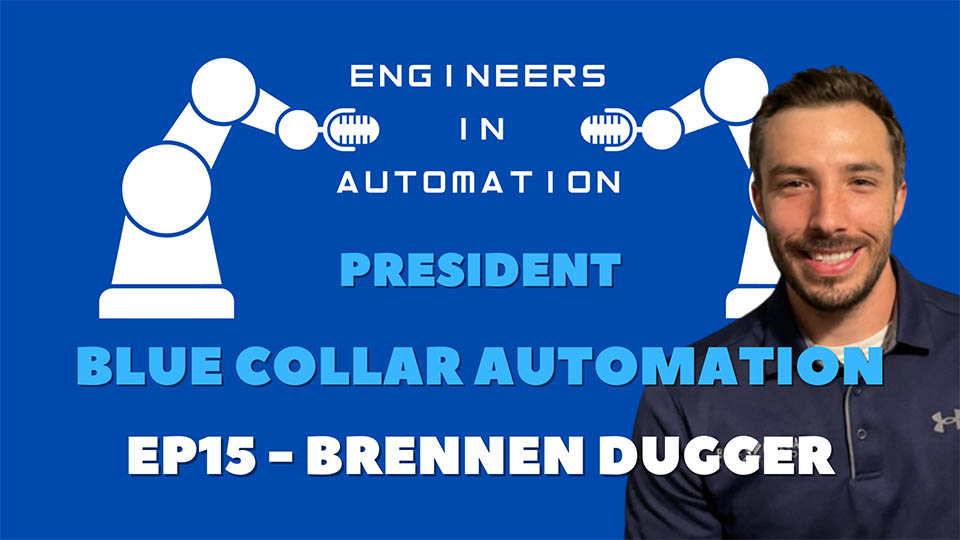Christine Frank | TCIC Inc.
Engineers in Automation - Christine Frank | Episode 20
In this episode, we talk with the President and CEO of TCIC Inc., Christine Frank. We have in-depth conversations about how to buy a business. We talk about the struggles that occur when new management takes over and how to keep employees happy. We discuss why she chose to purchase instead of going back to work for someone else, and we talk about the biggest challenges she’s faced as a business owner.
WATCH THIS ENGINEERS IN AUTOMATION EPISODE:
Keegan Dillon – Host (KD): Hi, my name is Keegan and I'm the host of Engineers in Automation. On today's episode, we're gonna be talking with Christine Frank. She's the president and CEO of TCIC Inc. We're going to talk about buying her business. We're also going to talk about growing the company, as well as we're going to talk about some of the difficulties of being a business owner. And then we're also going to ask her for some advice for someone who may also be interested in purchasing a company. Now, let's go talk automation!
KD: Welcome to Episode 20. I'm here with Christine Frank. She’s the president and CEO of TCIC Inc. Christine, welcome to the show.
Christine Frank – Guest (CF): Thank you for having me. I’m excited!
Christine Frank’s Professional Background:
KD: Good, good. And can you give everybody just a little bit of an intro about yourself?
CF: Sure, so my name is Christine Frank. Born and raised in Minnesota, don't you know? Just kidding. So I own TCIC, but I've been in the industrial automation and wireless space for over 25 years, but we won't tell you how many more over 25. Because if we do that, then you know how old I am. Can't tell you that. No. So my background, do you want to know that too?
KD: Yeah. Yeah.
CF: Okay. So my background is, like I said, factory automation, process control, and building automation, and I started out in water wastewater. And now, after I left that lovely, many years ago, I now own a company that sells to water wastewater. Pretty exciting.
KD: It comes full circle.
CF: Never thought I’d come back to it and here I am again, full circle.
The purchase of TCIC Inc.:
KD: Yeah, exactly. And then I just want to jump right into this question right off the start here. You did purchase TCIC. What caused you to do that? What was the catalyst for you?
CF: Insanity! No, I'm totally kidding. So covid hit. And I was sitting in my backyard with my husband after I got laid off from a software company, running an IoT partnership globally. And I said, “Honey, I don't know if I want to go back to corporate America. And I don't want to buy a nail salon.” So, my husband and I were talking, and when I first started out in the industry actually worked for a very small distributor, similar to what we are in the water wastewater industry, and also automation and engineering. And so my husband goes, “Well, there's this company called TCIC, that's for sale. And they do everything that you've been doing for the last 25-plus years.”
And I was like, “I think I've heard of them.” I didn't. So I looked on their website. The first thing I said was “Well, if I buy that company, we're going to redo that.” So, a week later, I met with the owner and a broker. And we started the dialogue. And approximately two and a half months later, I closed September of 2020.
KD: Wow, congratulations.
CF: Yeah, so I’ve owned it since September of 2020. It's been pretty exciting. It's been, Oh, how do we say it, an adventure?
How to purchase a company?
KD: Yeah, yeah, I bet. Um, I mean, how do you even go about purchasing a company sounds like you said you worked with a broker. How do you how do you even find a company? How'd your husband find out about TCIC even being for sale?
CF: Well, my husband is in the same industry. And he could see that I didn't want to go back through the meat grinder. So, before I bought TCIC, I had worked for four companies in the IoT space, or IIoT industry 4.0, the industrial side. And each one of them lasted for a whole two years. And I decided I didn't want to go back to work for industrial companies, because I was getting paid too much in IT space. Yeah, seriously.
And at the same time, I didn't want to take all my knowledge, give it to a company. And then in two years, they decided, thanks for teaching us everything see yeah, bye-bye. So, I started looking at TCIC, and what intrigued me the most was they were doing IoT and they didn't know it. Really traditional industrial automation, but a lot of remote monitoring. A lot of starting to get into analytics with predictive maintenance. We are an NDNO, which means we sell data plans for industrial devices, and they're not the same as phone devices.
And I started looking at the company and I was like, “Wow, I could really put my stamp on it and take it to the next level,” so, of course, you have to do your due diligence. Number one, what does that mean? It's not believing what the broker and the owner told you, it's believing what the financial people tell you. So you have to make sure that you run all the financials, you have to look into all the vendors make sure all the contracts are there.
I also bought it as a stock sale. So a lot of people don't understand why you buy a company as a stock sale. Well, the reason why as an industrial automation distributors, is what we mainly are, besides engineering and other stuff, is that if you buy a company as an asset, all those contracts are null and void. And when you buy it as a stock sale, and I learned this 25 plus years ago, you do it because all of your contracts with the manufacturer or vendor partners, at least will go to 90 days. That way, you can at least build a build a relationship, or if one of them goes in the tanker, then you can at least find somebody over that 90 days to replace them. So you're not left high and dry.
The other thing that it does, when you buy it as a stock sale, is you get the bank accounts, you get all of the credit and financing that goes with all of it. Where if you buy as an asset, you start all over even after the start over your HR. So everything flows over, when you do as a stock sale.
And my I remember when I told my, my accountant, he goes, “Why are you doing?” And I said, “This is why,” and he goes, “Absolutely make sense.” So what I actually did is I had to incorporate twice. So when you buy it as a stock sale, you buy it, I bought it under one entity, and then run it as another one. A lot of people don't know that either. It's for tax reasons. And also for if I want to do expansion, I can acquire another company under a stock sale the same way. And I don't have to change everything. So yeah, but a lot of due diligence. And no matter what you do, there are always going to be skeletons in the closet that you find out later. Because the owner and the broker are not going to tell you all of that until after you close and sign on the dotted line.
KD: Right. Right.
CF: So that was an adventure.
Roles as President & CEO:
KD: I bet that definitely, probably threw you off there a little bit and being a new business owner. You know, I do want to ask, I see that you are the president and CEO. What are the difference between the two roles for you?
CF: They're one in the same.
KD: Okay.
CF: The only differences is for from because we're incorporated, and we're not an LLC. We actually have a board of directors. So, I sit on both of those. And then, I have a silent partner, my husband, who is in the background. And also the reason why I did it too was because being in the industrial space, we work with a lot of federal government types of accounts because of water, wastewater, and infrastructure and public works. It looks really good when you're 100%. female owned, for a woman owned. So that's why we did it that way. Was really because then as things go out to bid, the federal government and the state and the local have to look at not just what we can do, but oh, wait a minute, we have two identical beds. But she's 100%. woman owned and we have to meet that criteria. I really don't care about that. But it looks good to them.
KD: Yeah. Right.
CF: What I care about is being really a value and a resource. And yeah, I'm a female. Oh, well. So I don't harp on that. But that's the reason why we did it was for those type of reasons, because of the type of business that 1/3 of it is, is with businesses specific, I mean that businesses, but targeting that water wastewater industry, you really have to have a little bit of an edge when it comes to, to bidding in those kind of things. Make sense?
New Company Turnover:
KD: Makes sense to me, makes complete sense. But I do want to ask a lot of times when you hear of somebody buying a company or a company, you know, getting bought by another company. Did you see any turnover? Was that an issue that you guys saw, or, you know, had to go through some of those growing pains sometimes?
CF: That's an understatement. Yes. So my essential employees, my original team, I have one person out of the four, excuse me, five that were originally here. So, the owner and his wife did stay on for a year under a consulting agreement. But when those two went away, I took over all of both of their duties. My operations person stayed with me, but my application engineer and my top sales guy actually moved on to other pastures. I don't know if they're greener, but other paths?
Keeping company morale up, during times of change:
KD: Yeah. Okay, well, yeah, that's good to know. And then, you know, is there a way to do that? You know, again, a lot of times these companies, as people get bought out and things like that, you do see morale sometimes change? Is there something that you did that, you know, maybe got everybody's morale boosted a little bit? You know, because sometimes people come in, and they're like, “Oh, I'm, and the new guys work, and they're gonna push us, and there's all this change coming.” And you know, you come in, is there anything you did unique that you think, you know, to help kind of keep people, you know, on the up and smiling and positive?
CF: Originally, in the purchase agreement, we actually put together, we put together in the contract two year agreements, where they would get bonuses paid out. Didn't keep them. And I think the change was too much. They weren't ready for it, I added on quite a few new product lines, I was really changing the way we were going to market.
And they the two other people that were here had been here 25 years, their website was awful. Everything was getting changed. And so I think really what it was, is they were so used to working for the former owner, that it was a good time for them to look internally at themselves. But hey, not a problem. And it worked out. And I ended up with some really good people to continue to support me. And the vendors, that's all been the same too.
So we haven't really changed much, but we've added a lot more and, and the reason why we add a lot more is. So originally the company was selling hardware, but they weren't selling the fries with that, meaning they weren't offering the cables and the cord sets and the additional components, which really is a benefit because of vendor consolidation. When your customer can buy more products from one vendor, it's a lot easier to manage and maintain. So that's really the reason I did it, not just because we wanted to add new products to complicate things, it was really to enhance the portfolio.
TCIC Inc. Products:
KD: Okay, great. And that literally rolls into my next question I wanted to talk about: what are some of those products that you guys supply?
CF: Yeah, absolutely. So the unique products that we supply, are a lot of cellular gateways and edge devices. That's on one side. So we offer Red Lion, HMS, we have about four other product lines, but I'll just mention Red Lion and HMS first, which is really cool, because now they're one company and I have both lines. I think I'm literally one of five across the nation that actually can represent both. So that's on our automation side.
But it also spills over to our wireless side because of cellular, right. So on the wireless side, we do radios actually do all different spectrums, whether it's Wi Fi radios, licensed unlicensed for RF radios is one of our top lines on that. And then we also fold back in all of those other gateways and things like that. And why it's unique is because anyone who's in the industry can sell a PLC, but not a lot of people understand networking, protocols, communications, and how wireless works. So we do that plus we offer the data plans that go with all the devices.
And that's really important because if you ever taken industrial device into an AT&T store, because someone told you to go get some data, they'll tell you to leave because those products don't work on those types of networks for phones. So not only do we supply to our own customers, we also sell nationwide data plans. And we also sell them because those IT companies that are trying to sell it to him don't understand static IPs. They don't understand security and industrial and they don't understand protocols. And so networking products and IoT products or industrial automation wireless products are really important that you understand it and how you deploy them. And a lot of the distributors and solution providers out there don't. And they actually come to me and ask for help.
Customers of TCIC Inc.:
KD: Wow, that's good. And then, you know, I wanted to touch on from products. And then who do you guys supply a lot of this too? I know, you talked a little bit about water treatment, you know, who are some of your other major, you know, industrial areas that you guys are working on?
CF: Yeah, absolutely. So we work with all different types of industrial customers, as I call it, anything on this cement side. We can work in agriculture, we work in dairy, we work in food and beverage, we work in machine tool building. So it's really split up this way.
We work with end users, OEM equipment manufacturers. And then we also work with system integrators. And we work with engineering firms, as well that sometimes are blended. But we're also a system integrator for wireless. And it's kind of weird. But we don't do any of the programming for the controls, necessarily, unless someone needs some help. And we will build panels specifically for networking types of projects. So we're not, we're not doing a lot of the PLC work, but we're doing the networking and the communications. Does that answer your question?
TCIC’s Growth Strategy:
KD: Yeah, yeah. I did want to ask, you know, since taking over this company, do you have a plan or strategy to grow it for the next, you know, five, ten years? Have you developed any sort of plan for that?
CF: Oh, yeah, absolutely. So our strategy is really to be a solution provider. Not only do we offer boxes, like every other distributor, but we offer engineering, and design services, as well as consulting. And that's free of charge, I don't charge people to come in and tell me to go through and help them optimize their machine. So my backgrounds, tell you a little bit of my education and why I'm talking about this consulting.
So my background is fluid power hydraulics, pneumatics, and electrical, and then industrial technology. And what that allows me to do is actually walk into, say, an end user or an OEM equipment manufacturer, and really look at, are they doing everything they could to maximize efficiency, reduced troubleshooting, whatever it might be, because I can look at it from the pneumatics, the hydraulics and the electrical and kind of look at it as a whole, a whole machine. Versus a lot of folks out there can only talk about the discrete side of it, or the process side of it. And I'm also blended across all, everything on the cement side of the house.
So it really helps with being able to look in and help customers find new ways to do things. And the other reason is, because, and why we're expanding and doing things is because my background is global. So, a lot of the distributors in Minnesota or the seven states around me, have only sold to those areas. Well, the truth is, I've probably been to over 3000, different manufacturing processes, manufacturers, plants, facilities, and I've done a lot of high-level development on networking protocols, and now into the IoT space with more advanced remote monitoring, where a lot of the folks out there haven't. So that's changing as far as our strategy is going and the types of customers. They're not necessarily set on how to do it, they need help. So I provide a lot of consulting on that. Well, our whole team does.
The challenges of running a company.
KD: Right, right. I do want to ask also, I know that, being a business owner is got a lot of difficulties. What's the biggest thing that you've seen now being a fairly new owner here? You know, what's the biggest thing that you've seen? The biggest difficulty?
CF: I think the most challenging is getting to know all the customers, we have so many in our repertoire, or, you know, database. I can't get to everybody. And the other thing is, is that the former owners didn't do a lot of education.
So when I worked for Siemens, we had a strategy of how we kind of thought about working with customers in the industrial space, and it was promote, educate, convert, and then keep. So we've been working a lot on the “Keep,” but also educating them on new technologies because if you don't do that, then you're just another box seller. Nobody cares. All they're doing that is going out and looking for the cheapest and cheapest doesn't always give you the right thing to use in your application.
And I think a lot of people forget about that. That you got to really look at the application before you even suggest a product just will even go out and help them find other products. That doesn't bother me at all. I'm not territorial, if there's something better that they should be using, and I don't provide it. They can buy it through me or I tell them exactly where to find it. It's, it builds a better relationship, and you become partners versus, “Hey, call that vendor.” Call her a partner.
Advice on buying a business.
KD: Yeah, yeah, that's, that's great. I do want to ask you to, again, the first person I've talked to you, that's that's bought a business. So I'm really interested in what advice would you give to somebody who's thinking about doing the same?
CF: Do your homework, do your due diligence, make sure you really understand what you're getting into. That’s the customer base, the understanding the relationships with all of the vendors. Your subcontractors that you use, because sometimes I go out and use other folks to build and engineer things for me that I can't do in house. Build those relationships, and make sure the first 30, 60, 90 days, that's the most important thing beyond understand the financials, is getting to know your partners.
Because they're the ones that support you. And if you're not building those relationships with those partners, whether it's a customer or a vendor. Well, finances are great, but they won't be there. If you don't know who you're talking to. And you're not building out those solutions, and also building on your brand. I didn't change the name TCIC in the sense of rebranding it, because it's been here for 30 years, build on that name. Sure, you can change things that don't go and throw the baby out with the bathwater.
Free time as the owner:
KD: Yeah. Great, great advice. I did want to ask you to you seem pretty busy. When do you get your free time? You know, if you're running this company, it sounds like you're on the go all the time? When do you get that moment to break? Do you do in the evenings, say, ”Okay, this is my time, my phones off, computers, off weekends.” What's your strategy there?
CF: Both. So what I mean by that is my brains always going and whether it's a strength or a weakness, some people would consider it. Um, so I have ADD, I don't have the H. So I'm not hyper. So my brain is always going. So one of the things in order for me to relax, is sometimes those things pop into my brain. So then I put a note on my phone and come back to it.
But where I like to spend my time is in the evening, and I like to do a lot of art. After my kids, both of them are out of the house, I'm an empty nester. After my kids left and COVID hit, I didn't know what to do. So I started picking up and doing drawing again. Before COVID, my daughter and I my oldest we were actually going to ceramics classes. Well, that got cut off. So I think I bought, don't tell my husband, probably $10,000 worth of art supplies. No, not really. It just started picking it up again.
Because during COVID, people were only talking about politics. And I thought I don't want to hear this anymore. So, I started drawing people's pets. So over the course of COVID, I did around 300 pictures, and sent them out to everybody framed for free. I didn't care. And it got people talking again, because they were just fighting over politics. What's the point?
So now, it's the same thing when I get home. I'm always thinking, take a note. And then I kind of hang out and do art. Or I do research or I write articles. And no, that doesn't sound very exciting, but I like doing it.
Connect with Christine Frank
KD: yeah, I'm with you there. I do some of the article stuff, and my wife does the painting. So I get it. I do want to ask you, where can people find you? How can people get a hold of you? Where can they connect with you?
CF: Yeah, absolutely. So you can go to our website, which is TCICinc.com. We didn't get the it didn't just get the TCIC. So if you send it, send it anything there. We're not the same. But they'll probably send me the email because we're friends, and my email address you can send it. If you want information, just do info@TCICinc.com. And then, you can find me on LinkedIn. I really don't do Facebook because not a lot of industrial people do. And I got kicked off Twitter, or X or whatever its called. But that's, that's a story for another time.
KD: That's another podcast.
CF: It's called. It's called. Yeah. Don't do it. Nobody reads it anyways from the industrial space, so I'm okay with that.
KD: Yeah, yeah, I try to focus on LinkedIn mostly. So, Christine, well, I have to say it was very great talking with you. And I learned a lot and thanks for sitting down with us today. And we hope that you enjoyed today's episodes. If you did, please give us a like, comment, share, and don't forget to subscribe and we hope you join us here next time on on Engineers in Automation. Thanks!
If you enjoyed that podcast episode, get more information below!
CONTACT OUR GUEST:
Follow Christine Frank on LinkedIn.
Learn more about Technology Controls | Industrial Communications.
SPECIAL THANKS TO OUR SPONSOR:
JOINER Services sponsored this episode. A platform where self-employed engineering contractors can showcase their own talents, and businesses have an opportunity to hire their services. If you want to learn more about JOINER Services and its engineering service platform for contract engineers, follow them on social media or sign up on their website.
